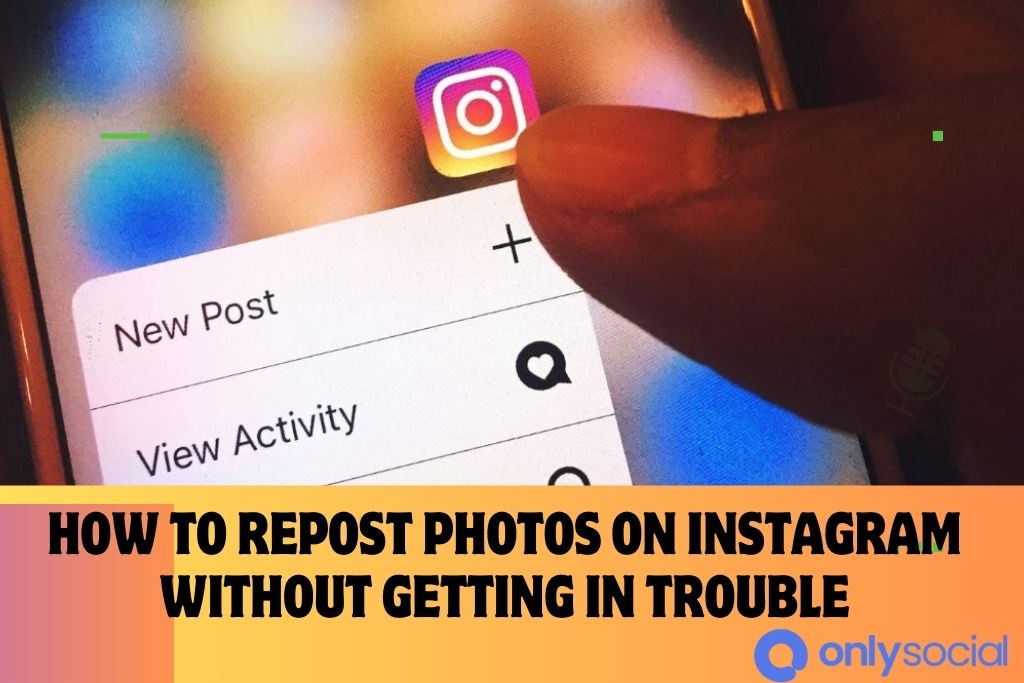How To Repost Photos On Instagram Without Getting In Trouble

In today’s digital age, social media platforms have become the go-to place for sharing and spreading captivating visual content. Among these platforms, Instagram stands out as a favorite for photo enthusiasts.
However, an important concern arises when reposting photos without proper authorization or giving credit where it’s due. This guide provides valuable insights on reposting photos on Instagram while respecting copyright laws and Instagram’s Terms of Use.
By understanding these guidelines and implementing clever strategies, you can confidently navigate reposting and honoring intellectual property rights at every step.
Table of Contents
- 1 Understanding Instagram’s Terms of Use
- 2 Asking for Permission to Repost
- 3 Giving Proper Credit to the Original Poster
- 4 Using Third-party Reposting Apps
- 5 Avoiding Copyright Infringement
- 6 BONUS
- 7 Frequently Asked Questions
- 7.1 What Are the Consequences of Reposting Someone Else’s Photo on Instagram Without Asking for Permission or Giving Proper Credit?
- 7.2 Can I Repost a Photo on Instagram if I Edit It or Add Filters to It?
- 7.3 Are There Any Limitations or Restrictions on Reposting Photos From Private Instagram Accounts?
- 7.4 Is It Necessary to Include the Original Caption When Reposting a Photo on Instagram?
- 7.5 Are There Any Specific Guidelines or Best Practices for Reposting Photos on Instagram for Business or Promotional Purposes?
Understanding Instagram’s Terms of Use
Understanding Instagram’s Terms of Use is crucial to ensure compliance and avoid potential consequences when reposting photos on the platform. Instagram’s content moderation policies significantly regulate user behavior and maintain a safe and respectful environment for all users. These policies aim to prevent sharing inappropriate, offensive, or copyrighted material that may infringe upon someone else’s rights.
When reposting photos on Instagram, it is important to be aware of the implications of reposting copyrighted material. Copyright law grants exclusive rights to the original creator of a work, including photographs. Reposting someone else’s photo without permission can lead to copyright infringement claims and legal issues.
To navigate these challenges, Instagram provides guidelines on how users should handle copyrighted material. According to their Terms of Use, users must obtain any necessary permissions or licenses before sharing someone else’s work. Instagram also offers tools such as reporting and flagging options to address copyright violations promptly.
Asking for Permission to Repost
Obtaining explicit consent from the original content creator is necessary before sharing their work on a different platform. When reposting photos on Instagram, asking for permission is legally required and an ethical practice that respects the rights and efforts of the content creators.
To ensure you are following proper etiquette guidelines, consider the following steps:
- Identify the original content creator: Know who owns the photo or video before seeking permission. This can be done by conducting a thorough search or contacting the account that posted it directly.
- Send a polite request: Once you have identified the original content creator, reach out to them via direct message or email with a clear and concise message explaining your intention to repost their work. Be respectful and provide information about how you plan to credit them.
- Wait for consent: Allow sufficient time for the content creator to respond before proceeding. Respect their decision if they decline your request.
- Give proper credit: If you receive permission, always credit the original content creator in your caption by mentioning their username or tagging them in the post.
Giving Proper Credit to the Original Poster
Acknowledging the original poster’s contribution is essential to demonstrating respect for their work and upholding ethical standards in content-sharing practices. When reposting photos on Instagram, it is important to appropriately credit the original poster by following attribution guidelines and considering ethical considerations.
To give proper credit, one should include the original poster’s username or handle in the caption or comments section of the reposted photo. This allows viewers to identify and locate the original content creator quickly. Additionally, tagging or mentioning the original poster in the caption or comments is good practice to notify them that their content has been shared.
Ethical considerations also come into play when giving proper credit. It is crucial to ensure permission from the original poster before reposting their photo, even if they are correctly attributed. Some individuals may not want their content shared without prior consent, so it is essential to respect their wishes.
Using Third-party Reposting Apps
Using third-party reposting apps can streamline the process of adequately giving credit to the original poster on social media platforms. These apps offer several benefits, including:
- Efficient and convenient: Reposting apps allow users to easily share content from other users, eliminating the need for manual screenshotting and cropping. This saves time and effort, making giving credit where it is due more accessible.
- Automatic attribution: When using a reposting app, the original creator’s username or handle is automatically included in the reposted content. This ensures proper credit for the original poster without additional steps.
- Increased reach: By reposting content from other users, individuals can broaden their audience and engage with new followers. This can lead to increased visibility and potential collaborations within the online community.
- Enhanced privacy controls: Some third-party reposting apps offer additional privacy features, allowing users to choose who can view or share their content. This addresses privacy concerns by giving individuals more control over sharing their posts across different platforms.
Avoiding Copyright Infringement
Individuals must be mindful of the ownership and rights associated with their shared content to prevent copyright infringement on social media platforms. Copyright laws protect original works of authorship, such as photographs, from being used without permission. Fair use is a legal concept that allows limited use of copyrighted material without infringing upon the rights of the copyright holder. However, it is important to note that fair use is subjective and can vary depending on factors such as purpose, nature, amount, and effect on the market for the original work.
When reposting photos on Instagram or any other social media platform, it is essential to obtain proper permissions from the copyright owner or adhere to fair use guidelines. Ignoring these principles can lead to potential legal consequences.
To better understand fair use and copyright laws related to reposting photos on social media platforms like Instagram, consider the following table:
| Factors | Description | Examples |
|---|---|---|
| Purpose | The reason for using copyrighted material | Educational purposes |
| Nature | The type of copyrighted work being used | Non-fictional works |
| Amount | The proportion of the original work being used | Using small portions |
| Effect | The impact on the market for the original work | Not affecting sales or value |
BONUS
Take the hassle out of reposting photos on Instagram with OnlySocial’s Post Planning and Scheduling function. Planning and scheduling your posts across all social networks is crucial for maintaining a consistent and engaging presence. With unlimited posting and the ability to manage unlimited social profiles, OnlySocial is your go-to tool for seamless reposting. Don’t miss out on this opportunity! Sign up for our commitment-free 7-day trial today.
Frequently Asked Questions
What Are the Consequences of Reposting Someone Else’s Photo on Instagram Without Asking for Permission or Giving Proper Credit?
Consequences of reposting someone else’s photo on Instagram without permission or proper credit include potential copyright infringement. This can lead to legal action, reputation damage, and loss of trust from the original creator and the online community.
Can I Repost a Photo on Instagram if I Edit It or Add Filters to It?
The issue relates to the propriety of reposting photos on Instagram without obtaining permission or providing adequate credit. The question arises as to whether modifying or applying filters to a photo grants an exemption from potential copyright infringement.
Are There Any Limitations or Restrictions on Reposting Photos From Private Instagram Accounts?
There may be limitations and restrictions when reposting photos from private Instagram accounts. These can include the need for explicit permission from the account holder, adherence to copyright laws, and respect for individual privacy settings.
Is It Necessary to Include the Original Caption When Reposting a Photo on Instagram?
When reposting a photo on Instagram, it is necessary to consider the inclusion of the original caption. Failing to do so may result in copyright infringement, as captions often contain important information about ownership and usage rights.
Are There Any Specific Guidelines or Best Practices for Reposting Photos on Instagram for Business or Promotional Purposes?
Guidelines and best practices for reposting photos on Instagram for business or promotional purposes include considering legal implications, such as copyright infringement, and ethical considerations regarding giving credit to the original creator and obtaining permission when necessary.

